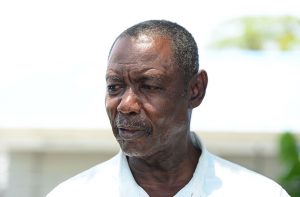…Ramjattan, several others back GECOM’s move to reduce use of private residences for voting
By Lisa Hamilton
PRIME MINISTERIAL Candidate of the A Partnership for National Unity + Alliance For Change (APNU/AFC), Khemraj Ramjattan, approves of the Guyana Elections Commission’s (GECOM’s) decision to reduce the use of private residences as polling stations, stating that it would put Guyana in a better position for credible elections.
The matter of private residences as polling stations is the most recent to be taken up by political leaders as the Opposition is calling for the reduction to be reversed while the government applauds the move.
It comes following a decision taken by GECOM, in principle, that private residences ought not to be used unless unavoidable.
It recently received the full support of all on the Commission but, mere days before Elections, Opposition-nominated Commissioners are creating a stir about the changes.
The Opposition believes that the private residences being changed to public buildings or GECOM-manned tents come primarily from their main support areas.
Meanwhile, others believe that no party should be pushing for the restoration of a relatively avoidable system which caused much conflict and doubt amongst the electorate for years.
GECOM IS IN CHARGE

As has been previously pointed out in the media, Ramjattan told the newspaper on Sunday that international observers to Guyana’s past elections, noticing the flaws within the electoral process, had encouraged GECOM to “ensure that citizens can cast their ballots in a neutral environment free from intimidation”.
“That was the recommendation of a number of international bodies that it must be moved away from certain private residences that have specific political partisanship and we had indicated, as the Alliance For Change, when we were not in the coalition government, that indeed these things should be reduced,” he said.
“I believe — and this is just my opinion — a lot of mischief was done there, especially during the PPP’s tenure where they got a number of votes as a result. We should not be disadvantaged by that and indeed the judgement call should be left exclusively on a majority decision of GECOM.”
He said this decision includes by how many private residences should be reduced and in which areas this can be accommodated.
The PM hopeful said that he strongly doubts that there is any merit to the Opposition’s claims that the changes are being made in “predominantly PPP/C areas” thereby affecting the party’s support.
He believes that the Party foresees a loss to the APNU+AFC and is therefore clutching at anything which would stir up its traditional support.
He stated: “They want provocation; they want violence in the society because it is only when there is provocation and violence and all of that that they get back their base support and that is what they want here.”
Even so, Ramjattan maintained that the decision on the matter must come from the seven-member Commission and not from the interference of the PPP/C.
THREAT TO CREDIBLE POLLS
The APNU+AFC PM Candidate said that he can still recall the days in when a large number of polling stations as private residences were used only to the detriment of the electorate.
“I have seen some of these PPP stronghold areas whereby the AFC scrutineers in 2006 and 2011 were literally chased out [from private residences],” Ramjattan recalled.
“It happened in several of these areas that we are arguing the private residences should be reduced. Because they [the scrutineers] were not known to be the forceful type, the bullyism got the better of them and they did not stay there in their location and all of a sudden you see the PPP votes jump up to almost 99 per cent in these parts.”
Meanwhile, Trade Unionist Lincoln Lewis, who has witnessed several of Guyana’s elections also gave the account that skepticism regarding credible polls have been high in the past when it came to private residences.
“There’s always the claim that when you do balloting at private residences, parties have been involved in shenanigans and shady business [regarding] ballot boxes,” Lewis said.

“It must stop. We must move away from it. That’s as simple as it is…let us don’t go at private residences and these things; let us try as far as possible to avoid it. Efforts are being made to avoid this; to minimize it but there are people who want to remain in that era to keep the status quo in play. You can’t have that. We have to change as we go along, we have to stop this whole process where we are encouraging agencies to continue doing the same things and getting the same results and the same criticisms.”
STAKEHOLDER INTEREST PEAKS
Now, Private Sector Commission (PSC) is calling for the Carter Center to “immediately publicly make the Center’s position clear on this matter”.
The PSC wants confirmation that the Center did indeed urge the Commission to ensure voting is conducted in a neutral environment and even called for the “the last minute and
abrupt changes” to be reversed.
The Carter Center, in a preliminary statement on May 27, 2015 and under the heading ‘Location of polling stations’ stated:
“Because of the lack of state establishments in some areas, 166 (or seven per cent) of these stations were located in private buildings and residences. While the establishment of polling stations on private property did not seem to negatively influence public confidence in the electoral process, The Carter Center recommends that GECOM take steps in future elections to ensure that citizens can cast their ballots in a neutral environment free from intimidation.”



.jpg)









